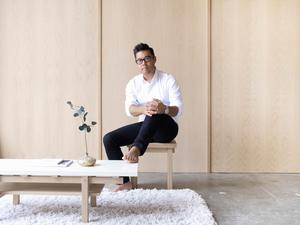
With new Small Business Administration financing in hand, prefabricated unit manufacturer Tomu Inc. is gearing up to lease a new manufacturing facility, start full-scale production and prove to private investors that it's a worthy bet.
With a new SBA-secured loan topping $500,000 through Capital Bank, founder and CEO Chris Osaka’s D.C. real estate startup plans to shift into a larger, 15,000-square-foot warehouse in Maryland, near Hagerstown though the company declined to specify the location, with a five-year lease and an option for another five years. There, it will begin producing orders of its luxury modular units for boutique hotels, while hiring more employees on its fabrication and manufacturing team.
Osaka said the SBA loan marks "a big milestone" for the company — one it attempted as it was starting up in 2020.
“It's something that we tried to get established very early on and go through multiple different lending resources to get this done,” he said, but “we had no history, we had no kind of proof of concept yet. So we had to kind of put our heads down, figure it out.”
Two and a half years later, Tomu has built out a prototype and collected a client list ranging from mom-and-pop operators to experienced hotel development companies. So when it went back to Capital Bank and SBA, it was able to score the financing it needed to, it hopes in the next six months, hire 10 people to join its seven-person team.
Tomu sits somewhere between an architecture firm, a construction company and a tech player, and it targets both the residential and hospitality sectors. It designs its prefabricated homes, it said, to feel more like luxury hotel rooms than tiny houses, with big windows and 9-foot ceilings. A studio villa, at 480 square feet, starts at $145,000, while a one-bedroom with 960 square feet starts at $235,000 and a two-bedroom spanning 1,440 square feet starts at $325,000, up from its launch prices. Those numbers can change based on specifications of the brand, but Osaka said at a base level, expect the price tag to sit at roughly $100,000 per room, rising to $500,000 per room for luxury materials.
Each prefabricated guest room will be built at Tomu's new manufacturing facility — an expansion from its current plant in Frederick, where it will move out within the next six months — or at one of its partner manufacturers in the South or West Coast, then shipped to clients for assembly. Once that new facility is up and running, Osaka expects to produce a minimum of 10 units per month and scale up to 200 by the end of 2024.
It hasn't always been an easy sell. Osaka self-funded Tomu's birth with $300,000 and had set out on a $2 million raise late last year with hopes of closing it early this year. The company has since said it's faced a "challenging macroeconomic environment" that's affected its fundraising. Today, the company has turned to crowdfunding platform StartEngine, where it said it hopes to raise $10,000 to $1.24 million by next Thursday. As of Friday afternoon, 101 investors had committed a total $156,600, though Osaka said he continues to eye a Series A round in the near future and knows he must convince investors of the market potential.
He said he built Tomu to solve the lack of supply in the commercial real estate market, which can then trickle down into the residential housing market to create a lack of affordable housing. Demand for hotels in the first quarter of 2023 grew by 5.5%, but the lodging stock remained flat, according to a CBRE industry report. This makes hotel rooms more expensive, which makes travelers turn more to Airbnb, which lures more investors to buy up houses to turn into those vacation rentals, ultimately driving up residential prices and leading to less affordable housing.
“If we can get you to buy our product and not some other home that could go to a family, then we can kind of help depressurize that affordability situation by approaching it in a slightly different way,” Osaka said. "The next milestone for us is not just delivering orders, but seeing the application purposes get out in the wild."



